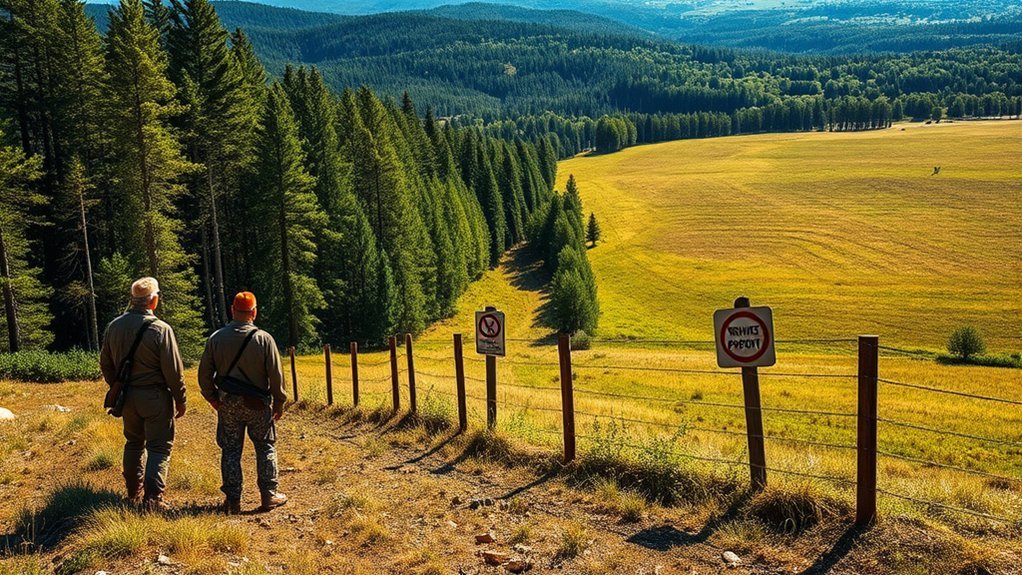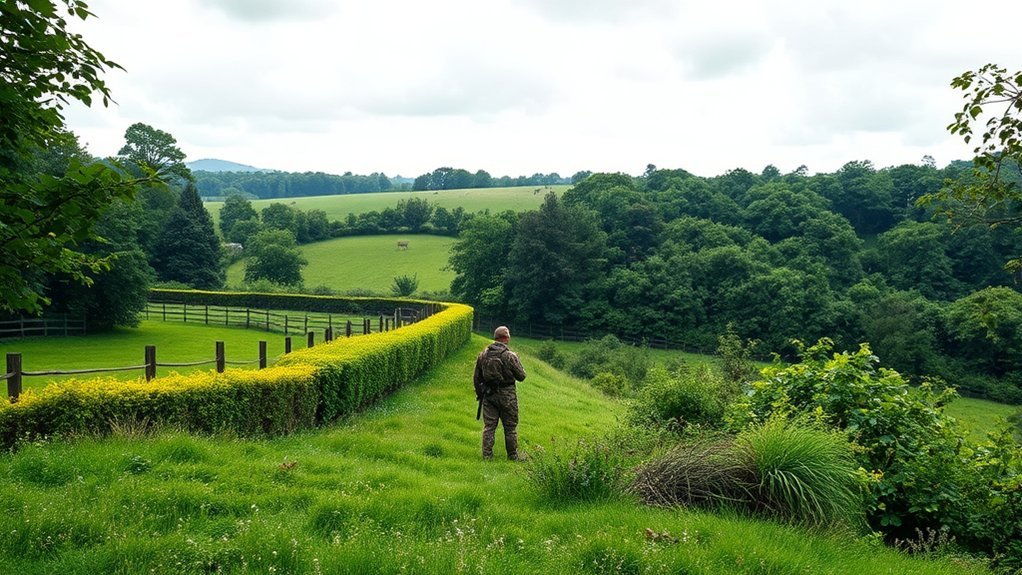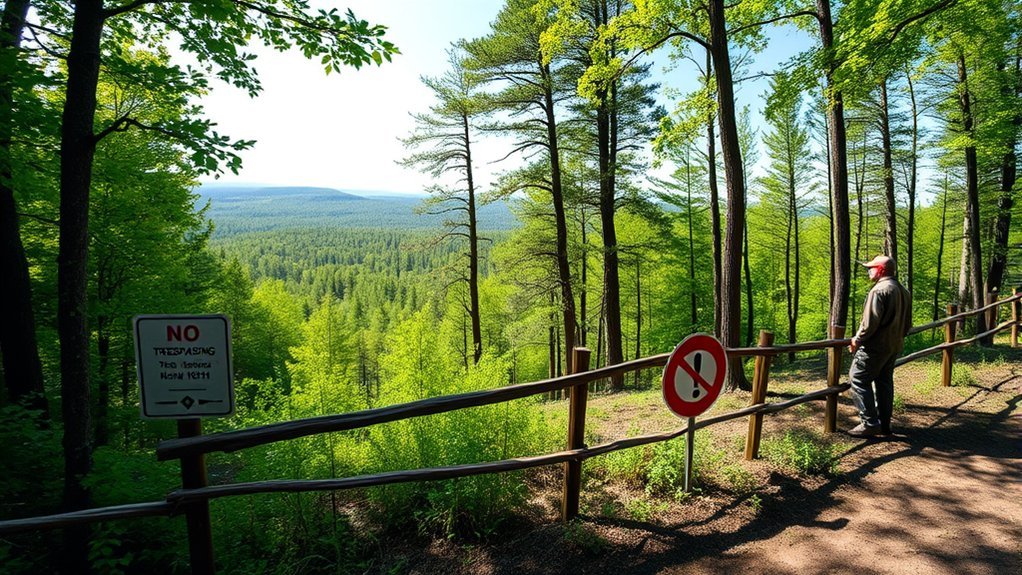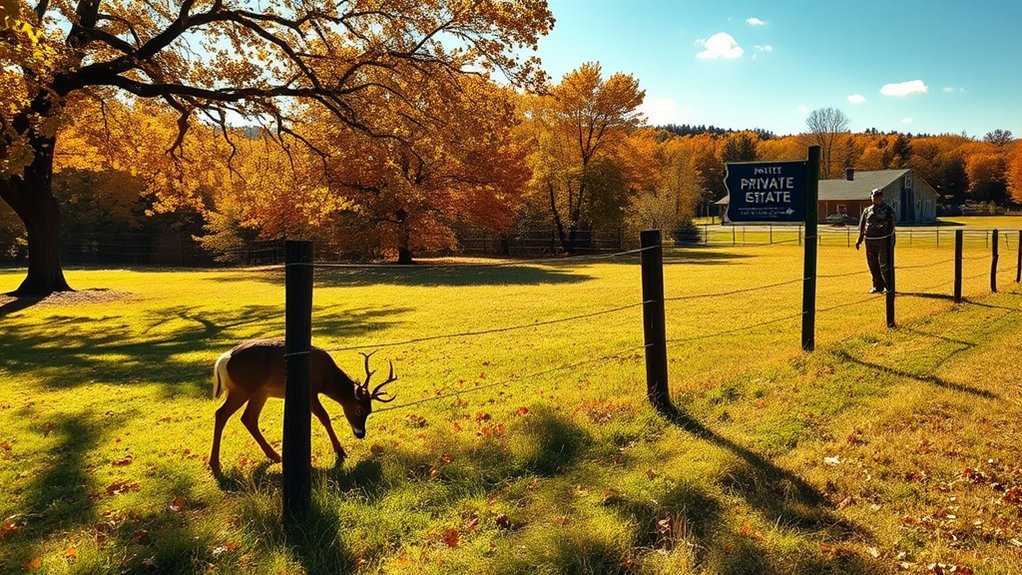When it comes to hunting, do you really know the differences between public and private land regulations? Understanding these distinctions is vital for a successful and lawful experience. Public land hunting comes with its own set of guidelines, while private land requires you to navigate permissions and potential restrictions from landowners. As you consider your next hunting trip, it’s essential to grasp the nuances that can impact your outing considerably. What should you keep in mind?
Overview of Public Land Hunting

Public land hunting offers a unique opportunity for hunters to access expansive areas teeming with wildlife, but it also comes with specific regulations that you must follow. Understanding these rules is essential for a successful and lawful hunting experience. Typically, public lands are managed by government agencies, which enforce guidelines on hunting seasons, permitted species, and licensing requirements. You’ll need to familiarize yourself with local regulations, as they can vary greatly by region. Additionally, you should be aware of designated zones, such as no-hunting areas or specific trails, to guarantee safety and compliance. Always practice ethical hunting by respecting wildlife and fellow hunters. Being informed and prepared not only enhances your hunting experience but also contributes to conservation efforts in public lands.
Overview of Private Land Hunting

When hunting on private land, obtaining permission from the property owner is essential, as access is not guaranteed. You’ll also need to understand any specific restrictions they may impose alongside broader hunting regulations. Compliance with these rules guarantees a respectful and legal hunting experience.
Property Owner Permissions
Hunting on private land requires obtaining explicit permission from the property owner, as failing to do so can result in legal consequences and strained relationships. Before you set out, it’s vital to communicate clearly with the landowner about your intentions and any specific hunting activities. You should discuss the type of game you’re targeting, the duration of your hunt, and any regulations they may have in place. Written agreements can help avoid misunderstandings and provide a record of your permission. Respecting the landowner’s property and privacy is important; this fosters goodwill and may open doors for future hunting opportunities. Always remember that building a positive rapport with landowners can enhance your hunting experiences considerably.
Access and Restrictions
While private land offers unique hunting opportunities, access and restrictions vary greatly from one property to another. Understanding these factors can enhance your hunting experience and guarantee compliance with property rules.
| Access Type | Description | Example |
|---|---|---|
| Open Access | No restrictions; all hunters welcome | Family-owned farmland |
| Limited Access | Permission required; specific hunters allowed | Friend’s private estate |
| Restricted Access | No hunting allowed; conservation areas | Wildlife reserves |
Before heading out, always check the specific access rules of the land you plan to hunt. These restrictions may include designated hunting seasons, specific game allowed, or even the need for a guide. Respecting these guidelines is essential for a successful hunt.
Hunting Regulations Compliance
Understanding the regulations governing private land hunting is essential for every hunter, as compliance not only guarantees legal hunting practices but also fosters respect for landowners and wildlife conservation efforts. To ascertain you’re following the rules, consider these key points:
- Obtain Permission: Always get explicit permission from landowners before hunting on private property.
- Know the Rules: Familiarize yourself with local regulations, including hunting seasons, bag limits, and weapon restrictions.
- Respect Boundaries: Stay within designated hunting areas and avoid trespassing on adjacent properties.
Access and Permission Requirements

When hunting on public land, you must understand the specific regulations that govern access, including season dates and permissible areas. On private land, obtaining permission from the landowner is essential before you can hunt, as trespassing laws apply. Familiarizing yourself with both sets of requirements guarantees a legal and successful hunting experience.
Public Land Regulations
Maneuvering the regulations for hunting on public land requires awareness of specific access and permission requirements that can vary greatly by location. Understanding these regulations is essential for a successful hunting experience. Here are three key points to take into account:
- Licensing: You must obtain the appropriate hunting license for the state or region where you’ll be hunting. Check local requirements to avoid fines.
- Season Dates: Public lands have designated hunting seasons. Familiarize yourself with these dates to guarantee compliance with state regulations.
- Access Points: Some public lands have restricted access points. Research designated entryways to avoid trespassing and respect wildlife habitats.
Private Land Permissions
Hunting on private land presents a different set of permissions and access requirements than public land. Here, you must obtain explicit permission from the landowner before hunting. Always respect the landowner’s rules and boundaries, as trespassing can lead to legal consequences.
To simplify your understanding, here’s a quick reference table:
| Requirement | Description |
|---|---|
| Permission Needed | Always seek verbal or written consent |
| Hunting Seasons | Confirm with the owner for specific dates |
| Liability Insurance | Some owners may require proof of insurance |
Regulations and Season Dates
Understanding the regulations and season dates for hunting on public versus private land is vital for any hunter aiming to stay compliant and maximize their experience. Each state has unique rules that can affect your hunting plans, so it’s important to stay informed. Here are three key points to take into account:
- Season Dates: Each game species has specific open and closed seasons. Check local resources to determine exact dates.
- Licensing Requirements: Verify you have the correct licenses for both public and private land, as requirements may differ.
- Bag Limits: Familiarize yourself with the daily and seasonal bag limits for the species you’re hunting, as they vary greatly between public and private lands.
Wildlife Management Practices
While many hunters focus on the thrill of the chase, effective wildlife management practices are essential for sustaining healthy ecosystems and ensuring future hunting opportunities. You play a significant role in this process by adhering to regulations that promote species conservation, habitat restoration, and population control. It’s important to participate in activities like habitat improvement projects, which can enhance food sources and shelter for wildlife. Monitoring animal populations also helps in maintaining balance within ecosystems. By reporting your observations and engaging with local wildlife agencies, you contribute valuable data that informs management decisions. Remember, responsible hunting practices not only benefit you but also preserve the natural resources and biodiversity for future generations of hunters and outdoor enthusiasts.
Safety and Liability Considerations
Adhering to wildlife management practices not only fosters conservation but also plays a vital role in ensuring your safety and minimizing liability while hunting. Understanding the risks and responsibilities involved can help you navigate legal complexities and protect yourself from unforeseen incidents. Here are three essential considerations:
- Know the Laws: Familiarize yourself with local hunting regulations to avoid legal complications.
- Use Proper Equipment: Invest in quality gear, like safety vests and appropriate firearms, to reduce accidents.
- Practice Situational Awareness: Stay alert to your surroundings, including other hunters and wildlife, to prevent dangerous encounters.
Ethical Hunting Practices
Many hunters recognize the importance of ethical practices in the field, as they not only enhance the hunting experience but also contribute to the sustainability of wildlife populations. Ethical hunting involves respecting regulations, understanding animal behavior, and making responsible decisions during the hunt. You should prioritize a clean, humane kill, which minimizes suffering for the animal. It’s essential to avoid overharvesting and to respect the habitats you hunt in, ensuring that you leave no trace. Supporting conservation efforts and educating yourself about local ecosystems further solidifies your role as a responsible hunter. By adhering to these ethical standards, you maintain the integrity of the sport and promote a positive relationship between hunters and the environment.
Tips for Hunting on Each Land Type
Understanding the different types of land you may hunt on can greatly impact your success and adherence to regulations. Each land type has unique characteristics that require different strategies. Here are some tips for hunting on public and private lands:
- Know the Rules: Familiarize yourself with the specific regulations for each land type. Public lands often have stricter guidelines, while private lands may have more flexibility.
- Scout the Area: Before you hunt, take time to explore the terrain. Look for signs of wildlife and potential hunting spots, particularly on public lands where competition can be fierce.
- Build Relationships: When hunting on private land, establish good relationships with landowners. Respect their property and communicate openly to gain access and build trust.
Conclusion
In the intricate dance of hunting, understanding the rhythm between public and private land is essential. Each type has its own set of rules, access requirements, and ethical considerations, much like traversing a maze. By respecting boundaries and adhering to regulations, you guarantee a harmonious experience that benefits both you and the environment. Whether you’re exploring the openness of public land or the intimacy of private property, staying informed is your best tool for a successful hunt.

